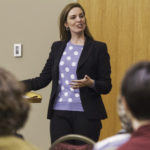Growing up, I never heard women could be called into church ministry. Now, I’ve met women who are either preparing for ministry or already serving as ministers. They consistently express a clearer sense of calling than the male ministers I know. Why?
While many women throughout church history experienced a call from God, Baptist women have begun to articulate that call as one to church ministry only in the past 30 to 40 years. In recent decades, women have felt the freedom to seek official, paid ministry opportunities in churches.
 Pam DursoFor Baptists, a monumental step in women’s public expression of their calling to ministry occurred Aug. 9, 1964, when Addie Davis became the first Southern Baptist woman to be ordained to the gospel ministry. Her calling and ordination, however, did not result in a ministry position in the South, and Davis had to move to the northeastern United States to find congregations to pastor.
Pam DursoFor Baptists, a monumental step in women’s public expression of their calling to ministry occurred Aug. 9, 1964, when Addie Davis became the first Southern Baptist woman to be ordained to the gospel ministry. Her calling and ordination, however, did not result in a ministry position in the South, and Davis had to move to the northeastern United States to find congregations to pastor.
By the late 1970s, the number of women enrolling in seminaries and seeking positions in churches began to grow, and the term “minister” underwent a redefinition in the larger Christian community and in Baptist circles. “Minister” gradually evolved to include more than just the pastoral office. In some churches, staff members no longer were identified as “directors” but recognized as ministers.
An evolution in thought
Because of this evolution of thought, some women on church staffs were recognized to be ministers, and a few churches, mostly in North Carolina and Virginia, began ordaining female youth ministers, children’s ministers, music ministers and education ministers. By 1978, according to Leon McBeth, as many as 50 women had been ordained in Southern Baptist churches.
The number of women’s ordinations grew quickly. Sarah Frances Anders confirmed by 1986, 232 women had been ordained. Most of those women were not pastors but were serving in other ministry roles. Today, about 2,250 women have been ordained by Baptist churches in the South.
While the number of women ministers increased dramatically during the last few decades, women continue to face obstacles as they seek to live out their calling. The Southern Baptist Convention has taken a strong stand against women pastors. Some other Baptist denominational bodies, as well as many local Baptist churches, do not approve of women ministers.
Sign up for our weekly edition and get all our headlines in your inbox on Thursdays
Because of these challenges, most every woman minister has had to study carefully the hard biblical passages about women’s roles in the church, has had to spend time in prayer and discernment about her calling, and has had to articulate clearly her call experience. She has had to share about her experience with sometimes-skeptical fellow church members or unsupportive family members.
Demands are greater
Most woman ministers have had to answer more questions about their theology, offer more explanations about their spiritual journeys and call experiences, and provide biblical evidence supporting their ministries than their male counterparts. Given this reality, it is not surprising the women ministers you encounter express a clearer sense of calling than do most male ministers you know.
Pam Durso, executive director
Baptist Women in Ministry
Atlanta, Ga.
Right or Wrong? is co-sponsored by the Texas Baptist theological education office and Christian Life Commission. Send your questions about how to apply your faith to [email protected].














We seek to connect God’s story and God’s people around the world. To learn more about God’s story, click here.
Send comments and feedback to Eric Black, our editor. For comments to be published, please specify “letter to the editor.” Maximum length for publication is 300 words.